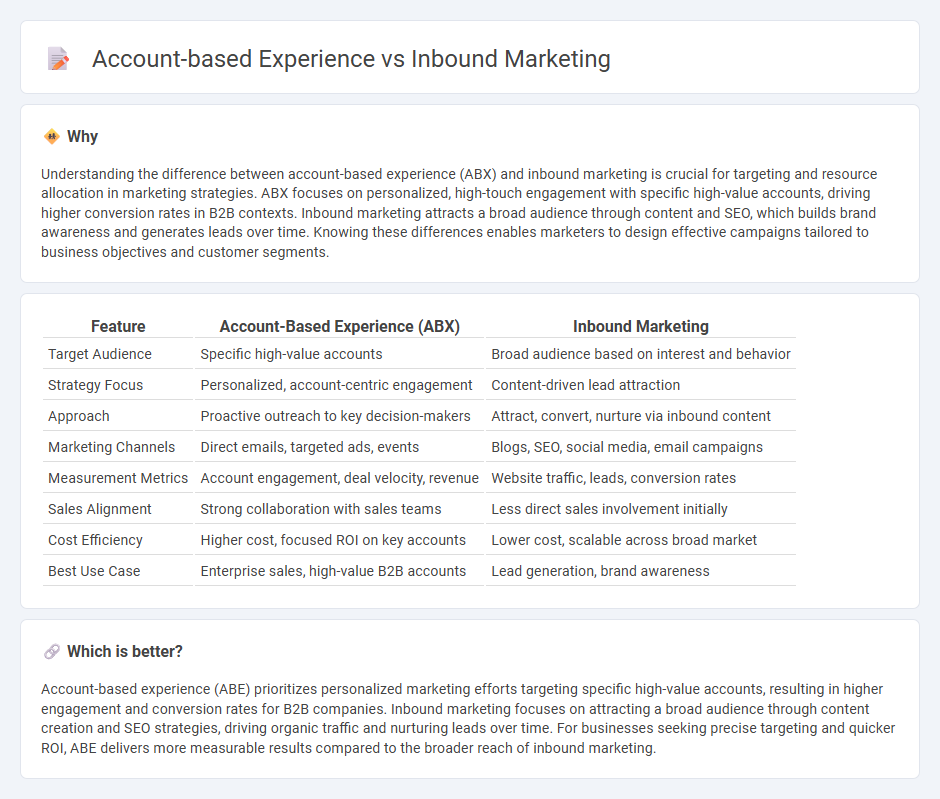
Account-based experience (ABX) targets specific high-value accounts by delivering personalized marketing and sales efforts, enhancing engagement and conversion rates. Inbound marketing focuses on attracting a broad audience through content creation, SEO, and social media to generate leads organically. Explore detailed strategies to determine which approach best suits your business goals and optimize marketing ROI.
Why it is important
Understanding the difference between account-based experience (ABX) and inbound marketing is crucial for targeting and resource allocation in marketing strategies. ABX focuses on personalized, high-touch engagement with specific high-value accounts, driving higher conversion rates in B2B contexts. Inbound marketing attracts a broad audience through content and SEO, which builds brand awareness and generates leads over time. Knowing these differences enables marketers to design effective campaigns tailored to business objectives and customer segments.
Comparison Table
| Feature | Account-Based Experience (ABX) | Inbound Marketing |
|---|---|---|
| Target Audience | Specific high-value accounts | Broad audience based on interest and behavior |
| Strategy Focus | Personalized, account-centric engagement | Content-driven lead attraction |
| Approach | Proactive outreach to key decision-makers | Attract, convert, nurture via inbound content |
| Marketing Channels | Direct emails, targeted ads, events | Blogs, SEO, social media, email campaigns |
| Measurement Metrics | Account engagement, deal velocity, revenue | Website traffic, leads, conversion rates |
| Sales Alignment | Strong collaboration with sales teams | Less direct sales involvement initially |
| Cost Efficiency | Higher cost, focused ROI on key accounts | Lower cost, scalable across broad market |
| Best Use Case | Enterprise sales, high-value B2B accounts | Lead generation, brand awareness |
Which is better?
Account-based experience (ABE) prioritizes personalized marketing efforts targeting specific high-value accounts, resulting in higher engagement and conversion rates for B2B companies. Inbound marketing focuses on attracting a broad audience through content creation and SEO strategies, driving organic traffic and nurturing leads over time. For businesses seeking precise targeting and quicker ROI, ABE delivers more measurable results compared to the broader reach of inbound marketing.
Connection
Account-based experience (ABX) and inbound marketing converge by targeting high-value accounts with personalized content that attracts and engages key decision-makers. ABX leverages inbound strategies like SEO, content marketing, and social media to draw in prospects organically, then applies tailored messaging and experiences to accelerate conversion. This integration enhances customer acquisition efficiency by combining broad inbound reach with precise, account-specific interactions.
Key Terms
**Inbound Marketing:**
Inbound marketing leverages content creation, SEO, social media, and lead nurturing to attract and engage a broad audience organically. It emphasizes attracting potential customers through valuable content and building trust over time, making it ideal for scaling brand awareness and generating qualified leads. Explore more to understand how inbound marketing can transform your customer acquisition strategy.
Content Creation
Inbound marketing emphasizes scalable content creation aimed at attracting broad audiences through blogs, SEO, and social media channels, enhancing organic traffic and lead generation. Account-Based Experience (ABX) tailors highly personalized content to specific target accounts, fostering deeper engagement and aligning closely with sales strategies for higher conversion rates. Discover how to leverage content creation strategies in both approaches for optimized marketing impact.
Lead Generation
Inbound marketing leverages content creation, SEO, and social media to attract a broad audience and generate a high volume of leads through educational and engaging materials. Account-based experience (ABX) targets specific high-value accounts with personalized campaigns and tailored messaging to increase lead quality and conversion rates. Discover how these strategies can complement each other to optimize lead generation efforts.
Source and External Links
What Is Inbound Marketing? - HubSpot - Inbound marketing is a methodology focused on attracting loyal customers by aligning with their needs through valuable content, creating lasting relationships that drive engagement and business growth.
What is inbound marketing? - Adobe Experience Cloud - Inbound marketing attracts and engages customers with relevant, high-quality content tailored to their questions and pain points, building lasting trust and relationships to improve brand conversion.
What is Inbound Marketing? Definition, Benefits & Trends - Inbound marketing uses a funnel strategy with stages like attract, engage, close, and delight by providing valuable content and solutions that guide prospects from awareness to purchase and beyond.
 dowidth.com
dowidth.com